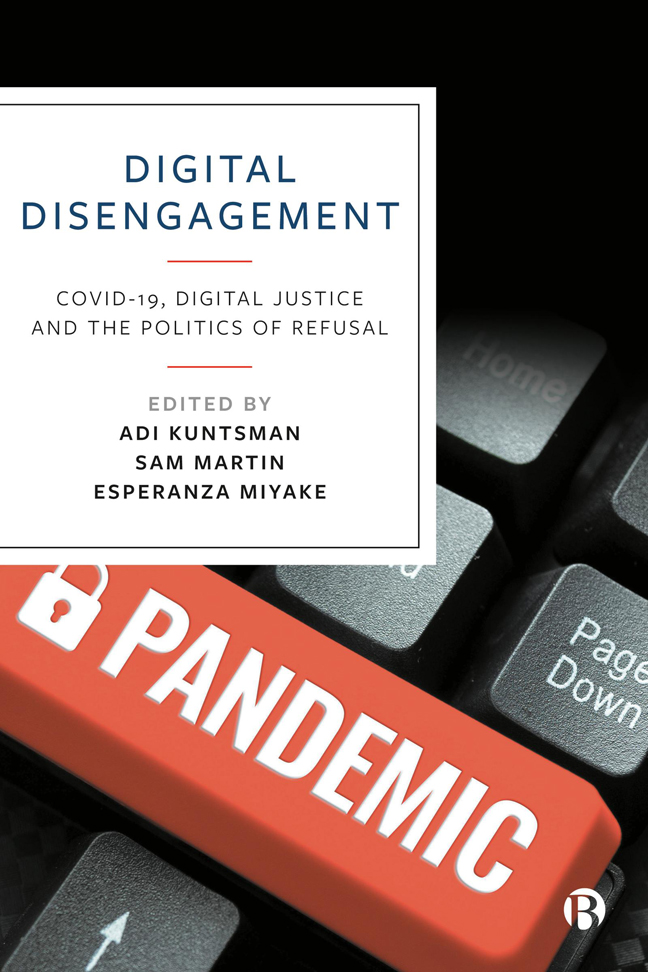Book contents
- Frontmatter
- Contents
- Notes on Contributors
- Introduction
- One En/forcing the Tokyo 2020 Olympics: The Racialization of Digital Engagement and Digital Solutionism
- Two Digital Engagements and Work–Life Balance in Creative Labour
- Three ‘#RoeVsWadeOverturned: Any Idea How Fast Your #PeriodtrackingApp Can Lead To Jail?’: Digital Disengagement and the Repeal of Roe vs Wade
- Four #SnailMailRevolution: The Networked Aesthetics of Pandemic Letter-Writing Campaigns
- Five Data Minimalism and Digital Disengagement in COVID-19 Hacktivism
- Six Digital Solutionism Meets Pandemic Imaginaries
- Seven State Violence, Digital Harms and the COVID-19 Pandemic: Imagining Refusal, Resistance and Community Self-Defence
- Epilogue: Digital Disengagement – Questions of Pandemic and Post-Pandemic Digitalities
- Index
Six - Digital Solutionism Meets Pandemic Imaginaries
Published online by Cambridge University Press: 25 January 2024
- Frontmatter
- Contents
- Notes on Contributors
- Introduction
- One En/forcing the Tokyo 2020 Olympics: The Racialization of Digital Engagement and Digital Solutionism
- Two Digital Engagements and Work–Life Balance in Creative Labour
- Three ‘#RoeVsWadeOverturned: Any Idea How Fast Your #PeriodtrackingApp Can Lead To Jail?’: Digital Disengagement and the Repeal of Roe vs Wade
- Four #SnailMailRevolution: The Networked Aesthetics of Pandemic Letter-Writing Campaigns
- Five Data Minimalism and Digital Disengagement in COVID-19 Hacktivism
- Six Digital Solutionism Meets Pandemic Imaginaries
- Seven State Violence, Digital Harms and the COVID-19 Pandemic: Imagining Refusal, Resistance and Community Self-Defence
- Epilogue: Digital Disengagement – Questions of Pandemic and Post-Pandemic Digitalities
- Index
Summary
Introduction
This chapter discusses environmental impacts of the COVID-19 pandemic, and, more specifically, the impact of the overall shift towards digital technologies during the pandemic and in post-pandemic times. The chapter builds on my long-term work on environmental imaginaries of digital technologies, the idea of digital solutionism in environmental sustainability, and the paradigmatic myopia with regard to environmental harms of digital technologies. My discussion in this chapter is driven by the question. when lockdowns, social distancing and other safety measures bring accelerated (and often compulsory) digitization, what space is left – if any – for environmentally driven digital disengagement, and what space is left to challenge the violent impact of extractive digital economies on human and non-human life, when pandemic safety is imagined predominantly as dependent on digital devices, connection networks and data?
Digital technologies and the global digital economy inflict significant damage on both humans and the environment, and contribute to global environmental injustice, as many of their harms affect first and foremost the Global South, whereas digital overconsumption mostly takes place and benefits those in the Global North. The harms include mining of the rare minerals needed to produce digital devices, the ever-growing amount of ewaste generated by digital devices (many of which are designed to only last a few years), and the energy demands and carbon emissions of internet traffic and data farms as well as of AI, deep machine learning, cryptocurrency and NFTs (non-fungible tokens) (Chen, 2016; Emejulu and McGregor, 2016; Good, 2016; Qiu, 2016; Velkova, 2016; Cubitt, 2017; Maxwell and Miller, 2020; Brevini, 2021; Truby et al, 2022). However, despite a growing number of critical voices, pointing to the environmental and human costs of digital media and communication, the subject remains on the margins of socio-cultural research into digital transformations. In environmental communication, for example, digital technologies are mostly instrumentalized as tools of effective messages, rather than as material entities with their own environmental footprint (but see several notable exceptions: Starosielski and Walker, 2016; Brevini and Murdock, 2017; Shriver-Rice and Vaughan, 2020). In addition, the majority of discussions around environmental sustainability and climate change are shaped by ‘digital solutionism’ (Kuntsman and Rattle, 2019) – a belief that digital technologies themselves are not only environmentally neutral but also beneficial for environmental protection.
- Type
- Chapter
- Information
- Digital DisengagementCOVID-19, Digital Justice and the Politics of Refusal, pp. 128 - 153Publisher: Bristol University PressPrint publication year: 2023

